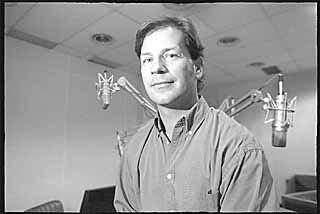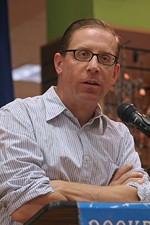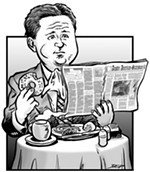Media Clips
Public Works: KUT's New Leader Has Big Plans for Austin's Public Radio Station
By Lee Nichols, Fri., July 28, 2000

Public radio personal-ities are known for their laid-back, calm demeanor -- Saturday Night Live even devoted a running skit to the stereotype of the soporific NPR reporter. But being the general manager of Austin's KUT radion station is anything but low-stress: As one of the top radio stations -- public or commercial -- in a city famous for its music and its full-contact political scene, KUT can't help but be a centerpiece of Austin's local culture. For decades, it has been exactly that. Once upon a time, it was the only decent radio station in town. Now, it faces competition from commercial stations, especially KGSR, that play music which was once reserved strictly for the left end of the dial. At the same time, it has had to face changes in the industry, including attacks on public radio funding in Congress. The station also found itself in the second-fastest growing city in the nation, and the laid-back slacker ethic that KUT both connected with and helped define was transformed by the dot-com world of fast money. KUT stands at a crossroads: It must transform itself into a station for the new Austin as well as the old, and figure out how to accommodate a changing demographic without losing the original one. And if that wasn't enough pressure, it must operate under the wing of one of the nation's major universities, one which expects to have the best of everything.
This past Valentine's Day, J. Stewart Vanderwilt stepped in to take over this Austin fixture, succeeding the troubled administration of Phil Corriveau, who left last year in a cloud of controversy. "Media Clips" sat down with Vanderwilt in his office at Guadalupe & Dean Keeton to ask him what changes are in store for his tenure, as well as what traditions will remain intact.
Austin Chronicle: What is your background in radio, specifically public radio?
J. Stewart Vanderwilt: Before coming here I was at Indiana Public Radio for almost 15 years. Indiana Public Radio is a small network of five stations in central Indiana. When I started there we were one station, and part of my job there was to help that station grow, and we built four others. We had a strong focus in regional news. [I] produced a national program [called] Rock & Roll America for National Public Radio, which is part of their national and international service.
AC: I'm not familiar with that program.
SV: We used to call it "history you can dance to." Take a cultural event, a point in history, a social idea, and we would examine it through the music of the time. We did [one show about] the connection of the assassination of John F. Kennedy and the British Invasion of rock & roll, and put these things in the context of the times. Basically, the type of rock & roll show you'd expect from NPR.
Before Indiana, I worked in Kansas for a public radio station, and before that I was in college. That was about '82.
AC: What made you come to KUT?
SV: A number of things. KUT is one of the leading stations in Austin, in the capital city of the second-most populous state in the country; our governor is running for president; our economy is growing and changing the community faster than we can even keep up with. It's the live music capital of the world, and this is the major public radio station in the community. It's a great place to live, and probably the hippest public radio station in the country, and that's where I want to be.
AC: Are you planning to form a news department at KUT?
SV: I think there is a major opportunity. KUT has a very strong national and international journalistic voice in the form of NPR and Latino USA, which we're a partner in the production of. One of the things that's missing is a local and regional journalistic voice, and I think that's an opportunity. It's a big undertaking to build something like that from the ground up, but that also kind of gives us an opportunity to shape something around the community.
AC: How big do you envision it being?
SV: Right now, we're examining the case for local news, doing the needs assessment, which in and of itself will be a pretty big undertaking. Out of that, that will give us a handle on what type of department we need to build. But this is one of those things where, to do it well, you have to do it significantly. So, my anticipation is that it is going to be pretty significant. ... Whatever we do, it has to have the same standards of context, perspective, journalistic standards, and production and presentation quality that you expect from a leading NPR station.
AC: Do you have any idea yet how you'll finance it?
SV: There's two things -- one is, certainly we'll look to foundations, organizations, donors, and station resources to find some of the assessment and initial start-up. On an ongoing basis, those activities should add to the value that KUT brings to the community. It's my expectation that, to the extent that we're providing a valuable service to the community, the community will support it. That's the tradition of public radio. Anything that we do should add to the value of KUT, and in return, I expect that we'll be able to support it the way we currently support the station, with 75% of our funding coming from the local community.
AC: Do you think it's going to require an increase in fundraising, or will you be able to pull it out of resources that already exist?
SV: There's a certain amount we're going to be able to do in the start-up out of current resources, but yes ... I expect us to increase our overall level of production. That takes more resources. But I think also we have an opportunity to [use] these resources somewhat differently than we are currently doing. I can't say yet how much we're going to add to the budget, and how much of it is going to be using what we have in different ways.
AC: Is it too early to ask where you might be squeezing this into the schedule?
SV: You know, I look at programming as a lot more organic than that. Take a biscuit, and separate all of its parts, and eat one part of it, it's not very good. ... We'll integrate it into a variety of points in the schedule, but an obvious concentration, though, [will be] in the morning and afternoon news programs. But it's not going to be exclusively there. There are things we're already working on, documentary-type things, that begin to introduce this type of course change to KUT.
AC: So you are thinking of having a news show and not just the two- or three-minute updates that some commercial stations do every hour or half-hour?
SV: There's already an expectation of what KUT would do based on our longstanding tradition as an NPR station, and so our approach to news needs to carry forward those values and expectations that people have of NPR. And that's how we'll approach local and regional news, in that same sort of format. In listening to NPR, there's headlines, and there's in-depth. I'll expect we'll have both on KUT.
AC: What are some of the other programming changes that people can expect under you?
SV: In sort of broad strokes, we're going to increase our level of production. So much of what we currently provide disappears the moment we do it. We produce all of our local programming live and in real time. And there's an important place for that. What I want to add to that is looking ahead and identifying things that need a whole other level of production.
For example, we're currently working on a documentary that will help commemorate the 30th anniversary of the Kerrville Folk Festival. We sent a producer to Kerrville, who lived in the camps, attended the campfires, listened to the stories and the culture that's built up around the folk festival. A project like that takes a lot of planning, takes a lot of production. There's a million stories in the naked city, and we're going to do some of them. We're working on a Texas music series that will examine the importance and influence of Texas music on music. We're working on a special on the role of the first lady in the presidency. We're working on a Christmas special both for local broadcast and national distribution.
KUT is an incredible resource, locally, regionally, nationally, internationally. It's so connected to the music and cultural life of Austin, which is so central to Texas music, which is so influential on overall music that I feel we have a responsibility to use that connection to help reflect it back to our community as well as celebrate other regions.
AC: There's all kinds of stories going around about a major overhaul that is supposedly going to occur at KUT. I heard a rumor that the music library is going to be dumped onto a computer, with the playlist to follow. I've also heard that you're going to dump Larry Monroe, and make Eklektikos a pre-recorded, scripted show. Is any of that true?
SV: [Laughs] Almost categorically, no. I heard one about Larry Monroe as well, and I have no idea where that came from. It's not even a consideration for me. I can see how putting the music library on computer, how some of my vision could be twisted into that.
AC: Where could that have come from?
SV: It comes from the concept that KUT needs to invest in a major overhaul of our technical operation and how we go about the process of production. Transferring our library to computer-based system would be arduous beyond the point of being valuable. But we will utilize a lot more digital technology than what we do. I've made that very clear from the beginning. As I talk about adding more production to our schedule, that's absolutely true. Does that mean we'd pre-produce everything? No, some things it just doesn't make sense to do that. It would be impossible to pre-produce John Aielli's program [in] the way that's just been described. That's not how John creates his program. But we will integrate digital technology into what we do. It will make what we currently do easier and more efficient, which will allow us to do more things. So in that sense, KUT will undergo a major technological overhaul, but that has nothing to do with Larry Monroe other than that he'll have more tools at his disposal.
AC: I think Austin old-timers fear that the big change in Austin's population will affect the really good local programming on KUT. I think there's a fear that the newcomers, who may not be attuned to our local cultural institutions, will call for more of the syndicated NPR programming that they may have heard in their previous homes. Do you feel a need to respond to those changing demographics?
SV: I think we definitely have a role in helping connect people with this community. People who are public radio listeners, the first thing they do in a new community is they look for a public radio station. What we want them to discover when they find KUT is a public radio station that has qualities of what they expect from a leading station in a new community and that it connects them to this new community. And I think KUT has an important role in that.
Many things in Austin have probably evolved around how the community has changed. Every community goes through some type of evolution. I daresay the Chronicle has probably evolved in some way. But the Chronicle has its differentiation from other media sources, as there should be. I think not simply to survive, but to meet our public service responsibility, that our station needs to reflect this. What we won't do is flip-flop around: "This format's hot now, so we're gonna go that way; we'll play that out for a few years, then go this other way." KUT is here for the long haul. We will have to evolve as the community does. It's not as simple as saying let's put on more of these shows and less of these shows.
So how do we make this a relevant and responsive NPR station, a public radio station for this community? It's a mix of things. A community like this needs a strong NPR station. We are and will continue to be a strong NPR station. But one of the things that differentiates us is how we're connected to this community, how we reflect Austin and Central Texas. And I want to build on that. ... There's not a simple plan, you know, more NPR, less this, more this, less NPR. I look at it as much more of an integrated process. ![]()
Got something to say on the subject? Send a letter to the editor.








